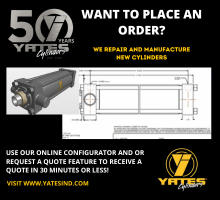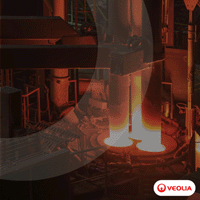German Steelworkers Demonstrate against Environment Minister’s Plans
03/30/2004 -
| Return to Steel News Headlines| Print This Page |
German Steelworkers Demonstrate against Environment Minister’s Plans
March 30, 2004 — More than a thousand steelworkers took part in a torchlight procession on the “Bridge of Solidarity” in Duisburg on March 29, 2004 to demonstrate against German Environment Minister Jürgen Trittin’s plans for emissions trading. Simultaneous protest actions were staged by workers at all German steel production sites.
The ThyssenKrupp Group is committed to the concept of sustainable development for future generations. The term sustainable development was coined by the World Environment and Development Commission in the 1987 Brundtland Report, where it was defined as development that meets the needs of the present without compromising the ability of future generations to meet their own needs. Prof. Dr. Schulz emphasizes,“The concept of sustainability is based on three equal pillars: social responsibility, ecology and economy. But ecology and social responsibility can only be sustainably developed if the economic base remains sound. The emissions trading plans put forward to date will seriously disrupt the balance at the expense of the economy.” |
The workers fear their jobs could be at risk if no allowance is made for process-related CO2 emissions from steel production. The demonstrators were joined by Prof. Dr. Ekkehard Schulz, Executive Board Chairman of ThyssenKrupp AG and Supervisory Board Chairman of ThyssenKrupp Steel AG, Prof. Dr. Ulrich Middelmann, Executive Board Vice Chairman of ThyssenKrupp AG and Executive Board Chairman of ThyssenKrupp Steel AG, and Ralph Labonte, who is responsible for human resources on both Executive Boards.
In Duisburg, Berthold Huber, Vice Chairman of the IG Metall metalworkers union, and the Works Council Chairmen of ThyssenKrupp Stahl AG, Wilhelm Segerath and Markus Bistram from Ispat Germany GmbH, appealed to the German government to issue the steel companies with adequate certificates to avoid putting them at a disadvantage in the international markets. Lady Mayoress of Duisburg Bärbel Zieling also expressed her concerns at the possible loss of jobs in a region where unemployment is already higher than average. Prof. Dr. Middelmann affirmed, “The German steel industry is sticking to its voluntary commitment and will achieve its CO2 reduction targets by 2010. This will provide a sustainable contribution to climate protection.”
The ThyssenKrupp Group is committed to the concept of sustainable development for future generations. The term sustainable development was coined by the World Environment and Development Commission in the 1987 Brundtland Report, where it was defined as development that meets the needs of the present without compromising the ability of future generations to meet their own needs.
Prof. Dr. Schulz emphasized: “The concept of sustainability is based on three equal pillars: social responsibility, ecology and economy. But ecology and social responsibility can only be sustainably developed if the economic base remains sound. The emissions trading plans put forward to date will seriously disrupt the balance at the expense of the economy.” He called on the government not to damage the economy as a pillar of sustainable development. It was wrong to consider only environmental aspects in isolation. He also pointed out that shifting CO2 emissions from Germany to other countries would change nothing in terms of global environmental protection. “As a material with a centuries-old tradition and great potential for further technical development, steel will remain indispensable in the 21st century. And demand for steel is still growing, above all in the countries of Asia, and particularly in China,” said Prof. Dr. Schulz.
ThyssenKrupp Steel’s steelmaking facilities are among the most advanced in the world. “But there are chemical and physical limits to the amount by which CO2 emissions from crude steel production can be reduced using today’s technologies, and we have reached these limits,” explained Prof. Dr. Middelmann. There is no alternative in sight to the traditional blast furnace.
The proposals put forward by the German Environment Ministry effectively mean that ThyssenKrupp Steel would have to acquire emissions certificates for a high eight-figure sum even in the first trading period from 2005 to 2007. These costs cannot be passed on to the market. The alternative would be production cuts. Both would result in the loss of jobs.
In view of the specific problems of the steel industry, for phase one of the emissions trading scheme ThyssenKrupp Steel calls on the government to issue free certificates for 100% based on CO2 emissions between 2000 and 2002. For subsequent phases, process-related emissions should be recognized in the required amount with no obligation to make further reductions, which would be technically impossible.



.png?lang=en-US&ext=.png)






